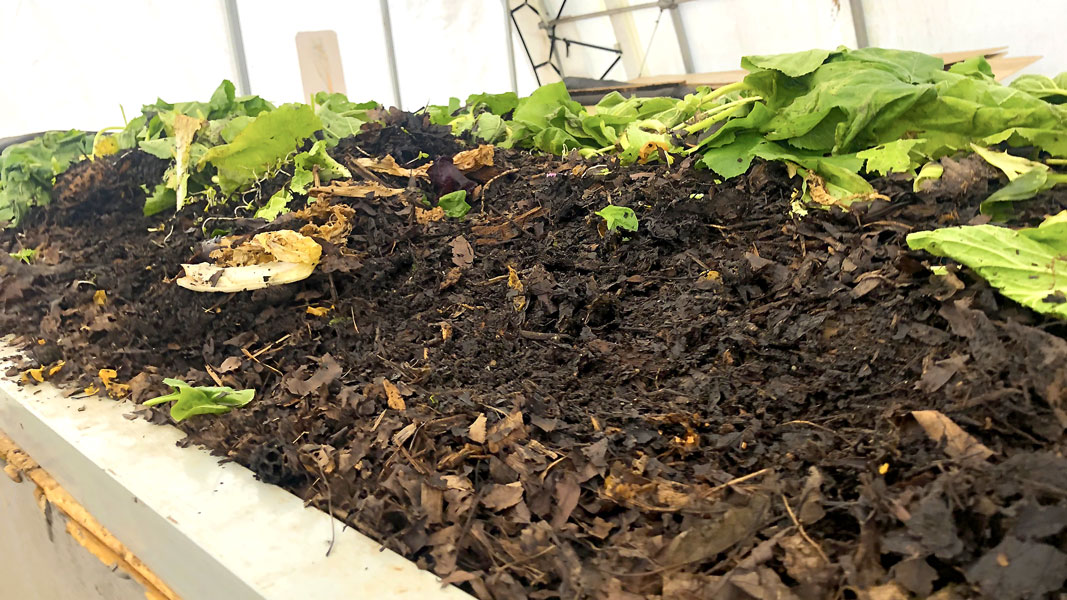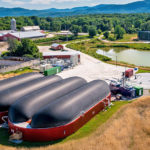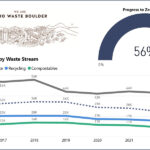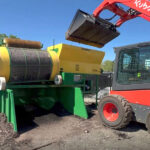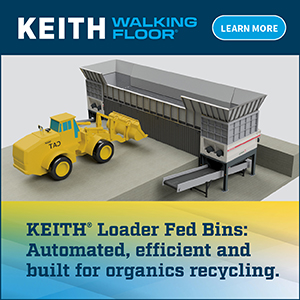Top: Two continuous flow-through vermicomposting units in a hoop house at ECO City Farms further process material following the thermophilic stage in aerated static piles.
Established in 2010, ECO City Farms is a non-profit, multicultural, Certified Naturally Grown, urban teaching farm with three locations in Prince George’s County, Maryland. Its mission is to “grow great food, farms and farmers.” The Bladensburg Farm operates on approximately 3.5 acres, a parcel of land that formerly housed two multifamily buildings that had to be razed. It is adjacent to a low-income housing complex with 480 units. The ECO City facility includes aerated static pile and vermicomposting operations, hoop houses, an urban farm and a community garden. Training programs for budding farmers are offered, along with other educational activities. Closing the loop in the community with harvested produce is a core part of ECO City Farms’ mission. It offers pay-what-you can shares in its CSA (community-supported agriculture) program. In addition, the City of Bladensburg buys CSA shares and sells them to eligible residents for $5/share.
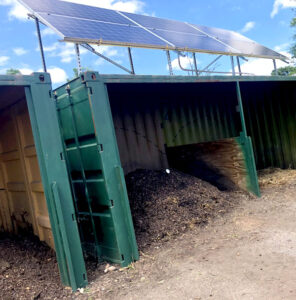
Two repurposed shipping containers fitted with aeration fans and solar panels for electricity have capacity to process over one ton/week of residential food scraps. Photos by Nora Goldstein
In 2021, ECO City Farms received a U.S. EPA Region 3 Solid Waste Management Assistance Grant in partnership with Compost Crew, Prince George’s Soil Conservation District, and the Institute for Local Self-Reliance (ILSR). Funds were used to install a Compost Outpost supplied by Compost Crew, a local food scraps collection service. About one ton/week of residential food scraps collected by Compost Crew from about 250 households in the Bladensburg area are composted in repurposed shipping containers equipped with 1-hp aeration fans and solar panels to power the fans. “There isn’t electricity service at the site, so we are totally reliant on the power generated by the solar panels,” explained Thomas Fazio, the compost manager, during a recent tour as part of the ReFED Summit in Baltimore. “That can be limiting, especially during the cloudier winter months.”
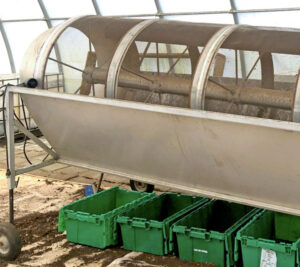
Vermicompost is screened and most of the product is used to make a “worm tea” that is applied on the fields.
Food scraps are blended with leaves and wood chips and composted for two to three weeks in the aerated containers, meeting pathogen reduction requirements. After the active composting phase, the material is taken to the adjacent “Wormhouse” that is equipped with two continuous flow-through vermicomposting units. “The compost is in mid-decomposition, which the worms love,” noted Kayla Agonoy, ECO City Farms’ Deputy Director. “Moisture in the beds is about 90%. A cutting bar on the bottom of the unit is operated by turning a crank, which is labor-intensive. The worm castings drop into containers under the unit. The material is pretty wet so needs to be dried enough before screening in our trommel.” The casting are used to make “worm tea” that is applied on the fields. Some of the vermicompost is blended into a seeding mix for the nursery.


